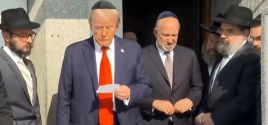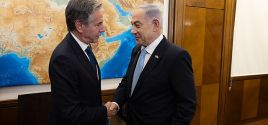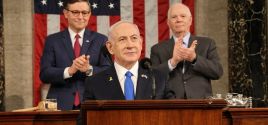Cheney still profits from Halliburton tiesMarie CoccoStatesman Journal Apr. 26, 2006 |
Popular 
WATCH: New Film 'Atrocity Inc' Exposes How Israel Lied About October 7th to Justify Genocide

Trump Visits Lubavitcher Rebbe's Grave With Ben Shapiro for October 7th

Report: U.S. Offering Israel 'Compensation' to Moderate Iran Strikes

U.S. Spends Record $23 Billion On Israel Since Oct 7

FEMA Running Out of Funds for Hurricane Victims After DHS Allocates Record $454M to Secure 'Mostly Jewish Institutions'
 WASHINGTON — It's not the $2 million tax refund. It's the $211,465. That is the amount of deferred compensation Vice President Dick Cheney received from Halliburton last year. It is the final payment, his lawyer says, of money due Cheney under an agreement that had the giant oil-services firm paying him for his past services as its chief executive officer. The payments continued after Cheney was elected and became chief honcho of American energy policy and one of the chief architects of the war in Iraq. The size of the refund owed to the vice president and his wife, Lynne, was the news event of the tax-filing season. What headline writer could resist a to-the-rich-go-the-refunds story? But we should not begrudge the Cheneys. The rich are indeed different from you and me. They have vastly more wealth, pay more taxes and get more back when their complex and ever-so-legal deals net a refund. The far smaller sum from Halliburton is a more exquisite symbol of the vice president's unrepentant arrogance. The $211,465 that Halliburton paid him in 2005 was more than Cheney’s government salary of $205,031. So who does he really work for? Us, supposedly. This is why the Halliburton payout, which Cheney negotiated before he ran for vice president in 2000, has always been controversial. And it is why Cheney’s dismissive attitude toward the appearance of a conflict of interest should have been taken more seriously back at the beginning — that is, before the word “Halliburton” became associated with the phrase “waste, fraud and abuse.” From the start, Cheney insisted that the Halliburton payments were an entitlement, earnings from his hard work as chief executive. And they are. But he also has misrepresented his continued financial ties to the company. “I have no financial interest in Halliburton of any kind and haven’t had now for over three years,” he said in September 2003. But Cheney was being paid the deferred compensation every year, under an arrangement that guaranteed payment, with interest, even if Halliburton went bankrupt. He also has held stock options worth millions, and many of these were exercised by an independent agent in 2005, with the proceeds rolled over into charitable contributions. The special administrator Cheney established when he took office still controls Halliburton options currently worth about $1 million, according to Cheney’s lawyer, Terrence O’Donnell. The complicated deal executed last year meant the Cheneys received no gain from the exercise of the options, and owed no tax on the proceeds. Fair enough? Not exactly. The ethics laws that apply to executive branch personnel are intended to eliminate even the appearance that an official’s policy decisions might be influenced by personal finances. “A public servant owes undivided loyalty to the government,” according to a 2003 Congressional Research Service report on the Cheney situation. Any advice or recommendation the official makes must “not be tainted, even unintentionally, with influence from private or personal financial interests.” The president and vice president are specifically excluded from the criminal sanctions that might apply to underlings. The risk of public opprobrium is supposed to work instead. Would oilman Cheney, working with oilman George W. Bush, have made the same decisions favoring oil-industry giveaways and invading oil-rich Iraq had the vice president not kept getting money from Halliburton? Probably. But at least taxpayers would not now suffer the affront of watching the vice president’s benefactor gouging us — while simultaneously paying him. The initial no-bid contract of $2.41 billion granted to Halliburton subsidiary Kellogg, Brown & Root to deliver fuel and repair oil equipment in Iraq was a debacle of cost overruns and billing irregularities. Pentagon auditors questioned $263 million of the bills as inflated or unsupported by documents. But the Army decided to pay almost all of the questionable costs, according to The New York Times. Meanwhile, a separate contract awarded through bidding also drew auditors’ complaints that KBR had failed to bring its costs into line or report them accurately. Through it all, Halliburton has been awarded profits as a percentage of its costs — including those costs questioned as excessive. It got separate government bonuses as well. Cheney insists he hasn’t been involved in any matters involving his old company. Nothing has emerged to directly contradict him. But surely the vice president knows of Halliburton’s shoddy performance and its preying on the American taxpayer. Another public official — perhaps someone as wealthy as Cheney — might have forfeited the Halliburton money. But not the vice president we have. _______________ Marie Cocco writes for the Washington Post Writers Group, 1150 15th St. NW, Washington, DC 20071. Send e-mail to [email protected]. |



